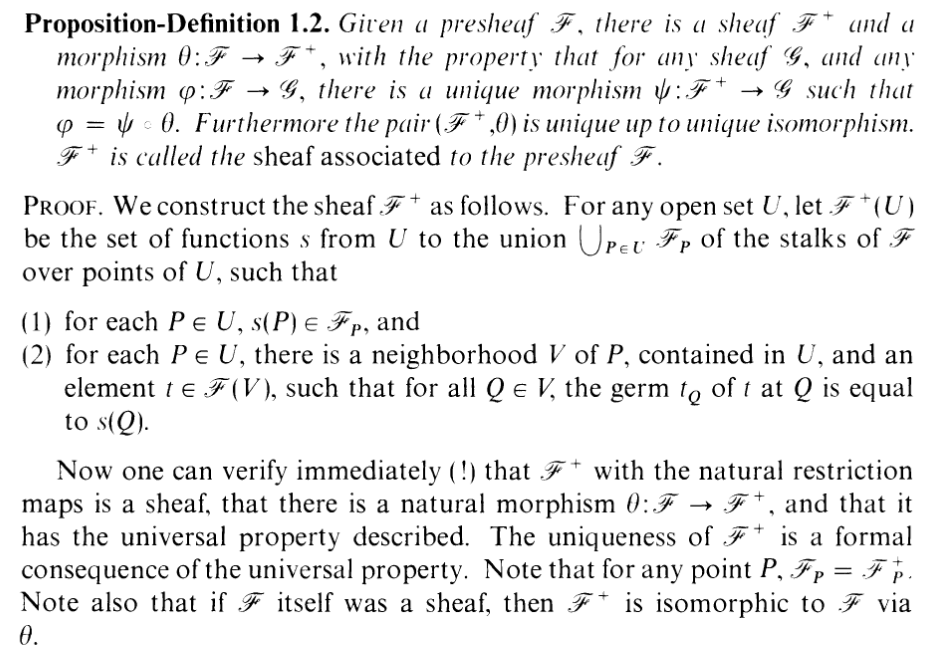II.1.22
1/19/2022

"Glue"ing? ...Seriously? Anyway, this is somewhat close to being "not worth
doing because it's just about the existence of a convenient object," but I think it's
worth doing for the sake of construction. So let's try2 NATURALLY construct
this badboy and not worry too much abt verifying its validity. Ad then, we'll be
done with section 1. WOOT SEASON FINALE SUCKAS. So here's how I went
about it:
Attempt #1: Sexting with sections
Okay, so this was my first idea. I defined
 (U) (U) | = ∏
P∈U
 i(Ui ∩ U) i(Ui ∩ U) |
Got U? Just iterate over all the
 i elements where they intersect U and
stick 'em together. Seems naturalish, but here's the PROBLEM: What if
they don't overlap in a consistent way? What if I pick s ∈
i elements where they intersect U and
stick 'em together. Seems naturalish, but here's the PROBLEM: What if
they don't overlap in a consistent way? What if I pick s ∈
 i(Ui ∩ U)
and t ∈
i(Ui ∩ U)
and t ∈
 j(Uj ∩ U) where s and t don't restrict to the same thing
(thru ϕij) in a neighborhood of Ui ∩ Uj ∩ U? That's not good. The
reason it's not good is if I go down to U = Ui, i'm getting extra elements
that aren't in
j(Uj ∩ U) where s and t don't restrict to the same thing
(thru ϕij) in a neighborhood of Ui ∩ Uj ∩ U? That's not good. The
reason it's not good is if I go down to U = Ui, i'm getting extra elements
that aren't in
 i(Ui) (so we won't satisfy the
i(Ui) (so we won't satisfy the
 i ≃
i ≃
 |Ui condition)
|Ui condition)
"Alrite, how about adding an extra stipulation that the components DO
pairwise overlap consistently, using the ϕij's?" Okay that seems fair. Maybe
that actually works, in fact. HOWEVER, I'm gonna ghost this idea. This
"extra stipulation" in the name of "consistency" reminds of another stud,
especially since after getting pounded the other night, my brain is STALKED.
Attempt #2: U can talk the talk, but can you stalk the stalk?
Remember the definition of sheafification?

Okay. I'm going to basically copy this definition. I'm gonna copy it and it's
GONNA WORK!!!
We construct the sheaf
 as follows. For any open set U, let
as follows. For any open set U, let
 (U) ⊂{s : U →⋃
P∈U
(U) ⊂{s : U →⋃
P∈U
 P} where "
P} where "
 P" can be taken as any stalk (
P" can be taken as any stalk (
 i)P
where P ∈ Ui. The choice of stalk doesn't matter cause they're isomorphic thx
to the ϕij's. And, the s must satisfy
i)P
where P ∈ Ui. The choice of stalk doesn't matter cause they're isomorphic thx
to the ϕij's. And, the s must satisfy
- For each P ∈ U,s(P) ∈
 P. Okay, THIS is where we use the triple
interesection property given in the exercise, although it's easy to miss.
The selection of s(P) doesn't matter on the which
P. Okay, THIS is where we use the triple
interesection property given in the exercise, although it's easy to miss.
The selection of s(P) doesn't matter on the which
 i stalk we use,
because it represents the "same" element in each stalk.
i stalk we use,
because it represents the "same" element in each stalk.
- Given P ∈ U, assume we've picked i as the representative index.
Then we must have ∃ a neighborhood V ⊂ U of P and an element
t ∈
 i(V ) such that ∀Q ∈ V : tQ = s(Q). The validity of
this property again doesn't depend on the choice of stalk because
the sheaves are locally isomorphic (so such a t exists so long as we
sufficiently refine)
i(V ) such that ∀Q ∈ V : tQ = s(Q). The validity of
this property again doesn't depend on the choice of stalk because
the sheaves are locally isomorphic (so such a t exists so long as we
sufficiently refine)
Yep. There's a STALKIFIED condition. I think the fact that this sheaf satisfies
the properties is "obvious". Other than uniqueness, which...
...........
Err, woops. remember that brilliant two-birds-with-one-horn trick I came up
with? Yeah... I probably shouldve done that here..... You know, using the
conditions to construct a unique object.... TOO LATE.
1 QED
So that's that for section 1 of Hartshorned II. Kind of a blistering short "finale," but those ain't so bad are they? Next section, we finally define the
famous scheme! WE ARE ENTERING THE HEART OF MODERN
ALGEBRAIC GEOMETRY. VARITIES? ZERO SETS OF POLYNOMIALS?
PSSHHHHHHHHH. I CAME HERE FOR THE 900IQ ABSTRACT STUFF
NOT BORING CONCRETE STUFF. MUAHAHAHAHAHA. SEEYA IN
SCHEMELAND.
Oh, and since this is a season finale, I made a closing picture on
my reflections on section
1.